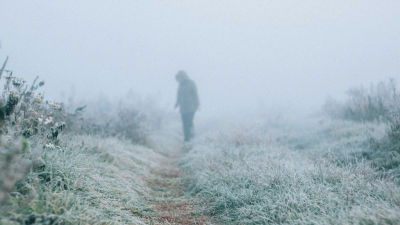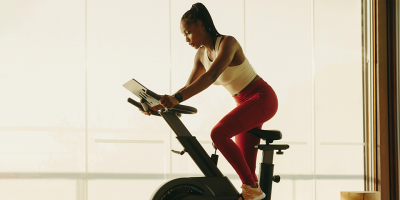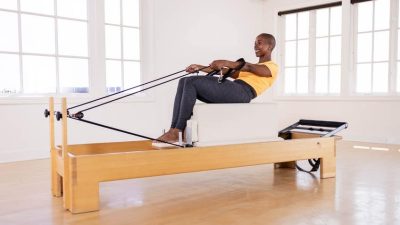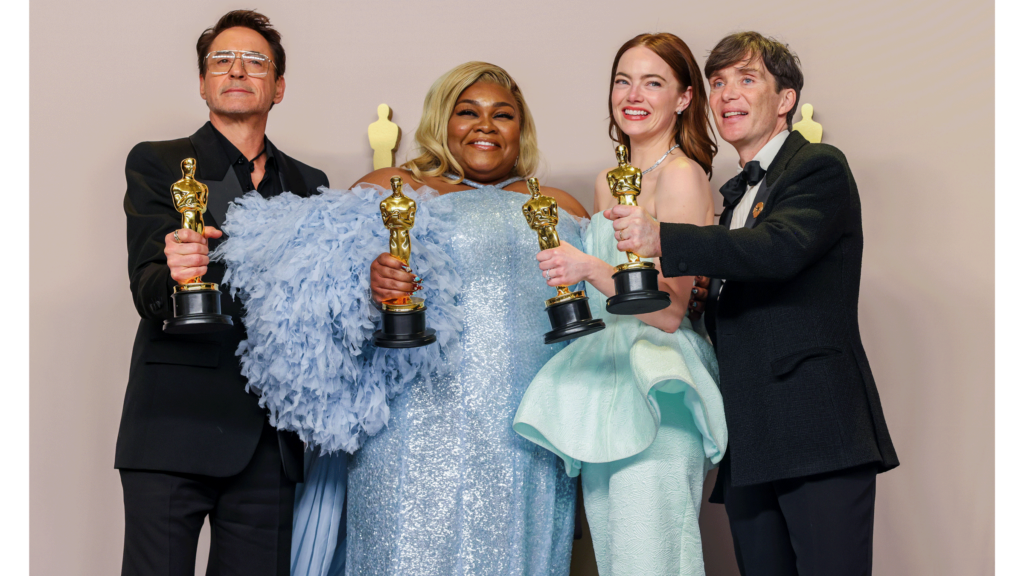
“], “filter”: { “nextExceptions”: “img, blockquote, div”, “nextContainsExceptions”: “img, blockquote, a.btn, a.o-button”} }”>
Heading out the door? Read this article on the new Outside+ app available now on iOS devices for members!
>”,”name”:”in-content-cta”,”type”:”link”}}”>Download the app.
No one ever stands on stage at the Oscars and acknowledges, in their acceptance speeches, “I want to thank yoga and meditation.”
Yet Sunday evening, there were an outsized number of Oscar-winning actors, directors, filmmakers, and singers who could easily have said exactly that. It’s understandable, given the 45-second time limit and all the obligatory expressions of appreciation, why these celebs wouldn’t mention the physical practice of yoga and meditative component on stage. Or that they wouldn’t take the time to explain how it helps quiet their thoughts long enough to help them discern fiction from reality, as it does for so many of us.
But here’s a look at what we know of several 2024 Oscar award winners and exactly what their experience with meditation and yoga has done for each of their performances as well as their life.
2024 Oscar Award Winners Who Practice Yoga or Meditation
Best Supporting Actress: Da’Vine Joy Randolph
Randolph’s portrayal of a “warm, witty cafeteria matriarch,” as The New York Times describes her role in The Holdovers, is yet another of the actor’s characteristic scene-stealing interpretations of a multifaceted character. Randolph’s only publicly known association with yoga mirrors that.
In a recent talk show interview, she recounted a rather dramatic dim sum outing in which a burglary took place at a nearby store. Amid the ensuing chaos and screaming taking place, Randolph explained how she responded by running into the restaurant kitchen, grabbing knives, and “doing these yoga breaths of fire.”
Although she didn’t engage in any obvious forms of breathwork while delivering her acceptance speech Sunday evening, she did possess a self-awareness and self-assuredness that tends to result from practicing yoga. “For so long, I’ve always wanted to be different, and now I realize I just need to be myself.”
Best Original Song: Billie Eilish and Finneas O’Connell
Although there are countless yoga playlists populated entirely with Billie Eilish tracks, her own practice leans toward meditation. According to an interview with the then-20-year-old star in V Magazine, she experienced a “very, very dark situation” following her sudden celebrity status.
“I couldn’t sleep,” she said. Stricken with what she described as “really, really unbelievably terrible nightmares,” she started using a meditation app. “I would listen to that meditation app every single time I needed to take a breath and not think about the horrors that were going on in my mind,” she said. Eilish has explained numerous times that she later drew on those nightmares to create her music videos that resonate with millions.
Her songwriting sibling, O’Connell, has his own approach to meditation. In an interview with Vanity Fair, he explained that he also struggles with challenging emotions and finds driving with a podcast or music in the background to be “very meditative.”
Best Director: Christopher Nolan
Clearly there’s an understanding of expanded consciousness by the creator of Inception, The Dark Knight, and Oppenheimer. The themes of individual responsibility, empathy, and fallibility of perception are strikingly aligned with some sort of practice of self-awareness. We’re guessing he meditates.
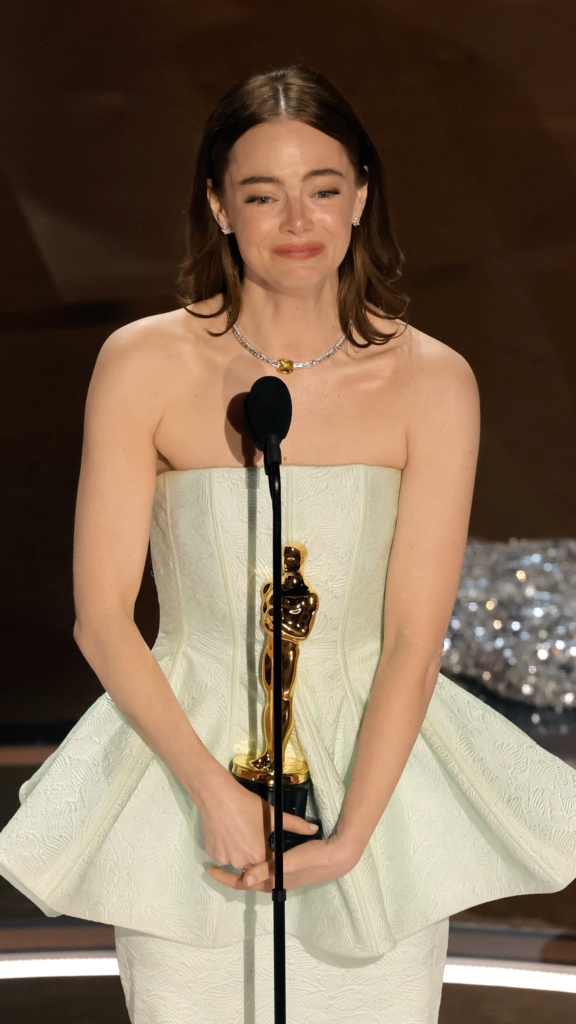
Best Actress: Emma Stone
It’s not unusual to see tabloids splashed with photos of celebrities—including Stone—toting a yoga mat as they walk into a studio. Although when Stone talks about her practice, she focuses on meditation.
“It’s changing my life completely,” she said in an interview with USA Today a decade ago. “I’m pretty into it. Once or twice a day, I meditate. That has been the best thing for my mind.”
More recently, she shared in an interview with NPR that her first panic attack occurred when she was just seven years old. When the interviewer asked if she turned to acting as an escape from herself and her anxiety, Stone beautifully explained that it was the exact opposite. “All of my big feelings are productive,” she said.
Stone went on to liken acting to meditating, explaining that both demand a focus on the present rather than allowing rumination about the past or fear of what’s yet to come be a distraction. As Stone explained, while meditating, you’re “living in the experience and living in your body.”
She demonstrated that in her acceptance speech for her role in Poor Things, calming herself as best she could—even as her dress malfunctioned—while admitting to the world, “This is really overwhelming.” Stone continued to share that in the days prior to the ceremony, she had been panicking about this moment. Director Yorgos Lanthimos had calmed her simply by saying, “Please take yourself out of it.” We’re betting he meditates, too.
Best Live Action Short: Wes Anderson
It’s uncertain whether filmmaker Anderson meditates or practices on a mat, although his adaptation of Roald Dahl’s The Wonderful Story of Henry Sugar is actually, in a convoluted sort of way, entirely about meditation. Disillusioned by magic, the lead character is drawn to yoga and its meditative aspects. There’s more to the story—a lot more—but certainly Anderson appreciates, and wants to convey, that meditation brings each of us what we need and not necessarily what we want.
That’s not Anderson’s only adjacency to yoga. Before his first film, he regularly hung out at an eclectic coffee shop in Dallas where he met yoga teacher Kumar Pallana, who “was like a one-man Ed Sullivan variety show,” according to an article in the Los Angeles Times. Anderson later gave Pallana character roles in several movies, including The Royal Tannenbaums and Rushmore.
Best Animated Feature: Hayao Miyazaki
Renowned Japanese filmmaker and animator Miyaziki is known not only for his perfectionism but his emphasis on depicting the quiet beauty in everyday moments and unremarkable places.
Reviews of Miyazaki’s current and past work note that his films tend to include a renunciation of ego and an ability to create an illusionist reality with the mystical just beyond plain sight of reality. Perhaps most related to meditation is the intentional stillness which Miyazaki builds into his scenes and that he refers to as the Japanese word “ma,” which he has described as “emptiness.” The effect is a moment of stillness and silence so that not just the character but the audience can take in the world’s beauty that might otherwise goes unnoticed.
And let’s not overlook that the somewhat autobiographical The Boy and the Heron itself has been likened to a “meditation on grief” by Rolling Stone.
Best Adapted Screenplay: Cord Jefferson
Honorable mention goes to writer and director Jefferson, who acknowledged his therapist during his Oscar acceptance speech for his work on American Fiction. Jefferson had previously shared in an interview with The New York Times that he has tried meditation, although not consistently. We understand. It’s not easy. We’re enthused to witness what artistry would result if and when meditation became a regular practice for him.
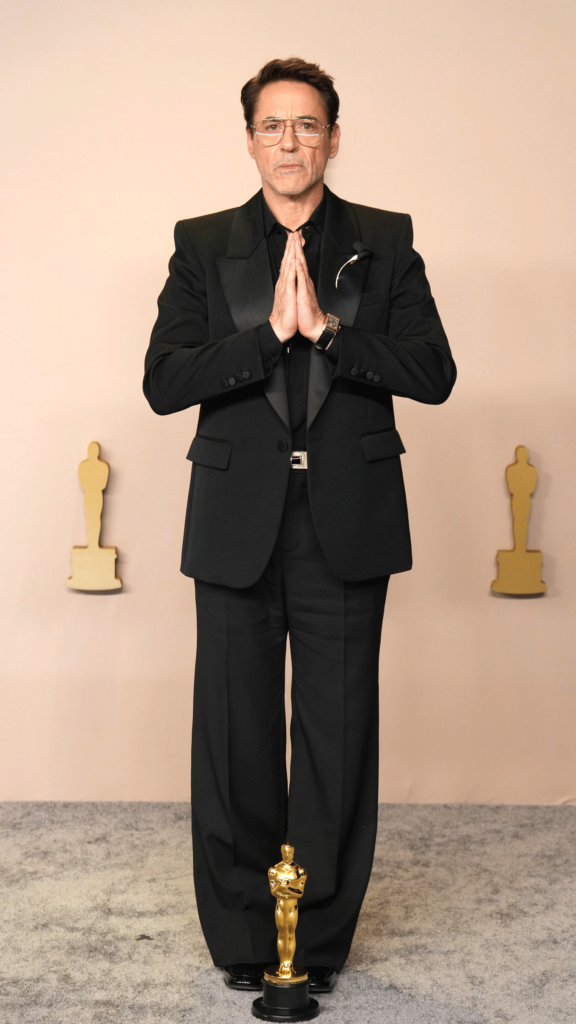
Best Supporting Actor: Robert Downey Jr.
You already know the story: Downey’s past struggles with addiction resulted in his 1996 arrest for drug-related charges, and he eventually spent time in prison. Since then, he’s changed his trajectory and has landed lead roles in box-office-smashing superhero films including Iron Man, The Avengers, and Sherlock Holmes prior to landing the supporting role in Oppenheimer.
What’s less commonly known is that yoga is one of the practices that helped him recreate his life and remain sober, along with 12-step programs, martial arts, and therapy. Downey worked extensively with Vinnie Marino, a Los Angeles-based yoga teacher who had also previously struggled with addiction.
“You get on the right side of the tracks, and now you are actually working with what some people would call magic,” explained Downey in an interview with TIME. “It’s not. It’s just you’re not in the f*cking dark anymore, so you know how to get along a little better, you know?”
It’s an approach to self-awareness that seems as though it draws equally from existentialism and meditation. After filming Oppenheimer, Downey explained to Vulture that when repeated takes of a scene were necessary, director Nolan would sometimes tell the actor to do literally nothing in the next take. That’s not an easy task for an actor. But Downey ceded.
“There was just this ongoing dialogue between a master filmmaker and someone who is open to a new experience,” Downey explained. That’s beginner’s mind, a tenet of yoga in which any situation is approached from the perspective of a novice and taken for what it is and exploring what can be learned rather than dwelling on how we think things should be.
That approach may have also helped as Downey endured host Jimmy Kimmel’s quips early in the awards show about Downey’s former drug use. The actor’s restrained demeanor during the assault may be the true definition of superhero.
Best Actor: Cillian Murphy
We’ve only heard vague references about yoga from Murphy as something that “middle-aged guys” do. Although Murphy has lent his voice to the Calm app, reciting “sleep stories” for users to unwind and relax. Props to the actor for facilitating the practice for others. Honorable mention.
Best Animated Short: Sean Ono Lennon
Acknowledged for his peace-promoting work War is Over! Inspired by the Music of John & Yoko, the youngest son of John Lennon and Yoko Ono is commonly referred to as a“psychedelic musician.”
In interviews and social media posts over the years, Lennon has spoken overtly about transcendental meditation (TM), which his late father practiced. “I don’t think of TM as a religious practice, though I’m sure it can be for some. But for me, it’s like a scientific method to calm my brain down and making my frontal lobe more active,” he explained in an interview. “It’s an exercise, really. It helps me to have about 10 percent more conscious thinking, which is good, because we make a lot of decisions in our subconscious that aren’t always good.”
Lennon has posted on social media promoting the Lumenate App, which he describes as a “psychedelic inspired meditation app.” Lennon is also known to share lessons learned from his personal meditation. Some of the comments are notably self-aware, others somewhat trippy, but all are grounded in thoughtfulness and the reminder that we could all be more understanding of others, including those whose viewpoints we don’t understand.
